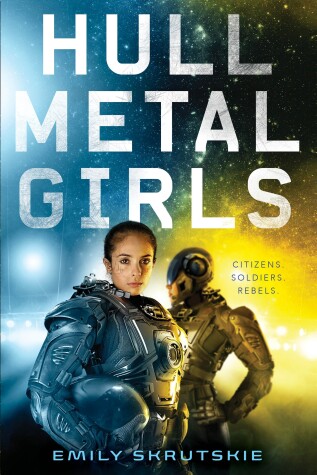
llamareads
Written on Jul 9, 2018
“An electric buzz settles into my skull, comforting and cradling, and I feel my heartbeat slow. This is right. This is what a Scela is meant to be. A living weapon, a replacement for the ancient guns that blew holes in the hulls of ships we lost so long ago that their names are no longer taught. We’re more elegant weapons. More civilized. Less clumsy or random. We’re built with the strength to hold this Fleet together.
For the first time in two weeks, I’m proud of what I am.”
It’s been 301 years since the Fleet left Earth to find a new planet. In that time, seven tiers of ships have emerged, originally divided by functions but now basically a caste system, with the First District holding the seat of government and the Seventh having Dickensian manufacturing ships, child labor and all. Naturally, with a system like that, you’re going to have some unhappy with the status quo: the Fractionists, who believe that separating the Fleet into smaller groups will help them find a habitable planet sooner. Lately, the Fractionists have gotten rowdier, and have led to a recruitment drive for the Scela, the surgically modified peacekeeping force for the Fleet. Out of dozens of applicants, only four survive the surgery, including our two teen protagonists: Key, a First District girl who has giant holes in her memory, the largest being why she decided to sign up, and Aisha, a Seventh District girl who signed up to buy a better life for her sister and ill brother. Things are not quite what they seem (are they ever?), and soon the fate of the Fleet is in their hands. Can they overcome their differences and work together?
“A grin breaks over my face, uncontrollably wide thanks to the augmentations. I can do this. I can command my body, be the perfect tool I was sculpted into, earn my place in the Scela ranks. I can carry the weight of the exo on my back—it’s nothing compared to what I’ve borne already.
I may not be a useful Scela yet. But I will be damned if I’m not a useful sister.”
One of the surprising – and enjoyable – part of the books is that the main focus is not on a romance, but on the friendship between the two teen girls. To start off with, the characters are a bit hard to like. Aisha is (understandably) so obsessed with her brother and sister that there’s not a lot else to her character. Key is a snotty snobby teen who basically thinks herself better than everyone else, especially the Fractionist hoi pollloi (the big reveal of who she actually is will probably not be a surprise to anyone).
The part that worked best for me was the bit of sci-fi horror mixed in. I feel like I’ve read a lot of scifi involving enhanced soldiers, but it seems like most of them can “pass” for normal humans. Scela soldiers, however, can’t be mistaken for anything else, even out of their mech armor, and part of the integration is a sort of AI mind that helps them control the new tech embedded in their bones. In addition, each team can be connected through an exosystem, which transmits some of their thoughts and strong feelings to the others. Through willpower, one of the team could seize control of the others, and, in fact, on missions the team is usually controlled by a higher level person’s orders. There were thought-provoking issues of consent here, one of the major ones being the characters’ sexuality. Aisha is aroace, Woojin is pan, Praava is trans hetero and Key has so many holes in her memory it’s just one thing she can’t remember. While these labels are mentioned, I didn’t really feel like they had any effect on the overall story, and the way in which they come out (the characters are forcibly outed due to the effects of the exosystem) left a bad taste in my mouth. As another issue of representation, Aisha follows the Muslim-esque Ledic religion. Before the Scela surgery, she wore a headscarf and regularly attended temple, and she still prays. One of the Ledic tenets is that they believe that through traveling they will earn a new home, and that God’s promised a planet for them. I’m not Muslim, so I can’t speak to how well most of it was handled, but several team members are dismissive of her beliefs, with Key being especially nasty.
As for the rest of the story, I liked several secondary characters (Aisha’s siblings, Zaire the dock worker, and Marshall Jesuit are the top of my list) and though I thought the plot was predictable, the pacing and overall tension were good. Overall, while I liked the book, I have concerns about some of the representation, so I’d probably give it 3.5 stars, rounding up to 4.
I received this book for free from NetGalley in exchange for an honest review. This does not affect my opinion of the book or the content of my review.
